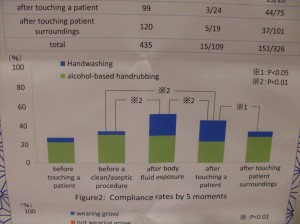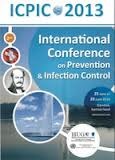When I last blogged, way back in mid-April I was in need of a holiday, and was experiencing a mixed bag of events, although on the whole things were turning more positive, with enjoyable times being had with both Women In Science (#WISAnEveningWith) and the #GetStoolSmart campaign at UHCW.
So what has happened since?
Well, I managed to get away on the eagerly anticipated holiday! As with all such things, it seems a very long time ago now, but it was a wonderful break, and a great opportunity to spend some time outdoors (in all elements…!). This isn’t a “Postcard From…” blog, but honourable mentions must go to (Dyfi Osprey Project, Welsh Cakes, MOMA Wales, Cadair Idris, and A Nets Catch). Whilst I cannot say that I switched off from work completely (probably never possible for anyone), it was certainly much more pleasurable to be going through my presentations (Doctoral/IPS) in my head whilst faced with scenery like this…
Doctoral Work – Getting it “Out There”
I hit the ground running when I got back from holiday, with the WMG Doctoral Conference (Healthcare) on the 29th April, a positive chance to not only share my PhD progress with peers and WMG, but also to catch up with what other Doctoral students have been up to in the last 12 months. A PhD can be an isolating experience, especially when (like me) you are researching something “different” so spend most of your time working independently – so events like this are a welcome chance to gain feedback both professionally and personally. Fortunately the presentation seemed to be well received, and discussions over lunch were all positive, with great use of the word ‘rigour’…always a good thing to hear about your work when you’ve reached the ‘only writing up now’ stage I think…!
The 9th May saw a second opportunity to share my work, this time as an Invited Speaker at the IPS Ambulance Forum and Audit and Surveillance Forum Conference (“Every Bug Counts!)” in Birmingham. This was my first IPS meeting (outside of presenting my Poster at IPS 2012 last year), and I was absolutely blown away by the welcoming, supportive and truly friendly atmosphere; could not have been a more positive experience. Speaking after the ‘event’ that is Martin Kiernan, and with IPS President (not to mention Hand Hygiene legend!) Julie Storr mere meters away I think the word nervous barely covers it, but the excitement of being able to talk about my work, and knowing I was (in a way) representing the brilliant participants at my case study site helped me focus. And I think I got away with it…
Finally, I also found out I’ve been accepted to present my Poster summarising Studies 1 and 2 at ICPIC 2013 in Geneva at the end of June. Excited? I believe I may have jumped a bit when I read the email. Fortunately I wasn’t in public… Anyhow, bearing in mind the sheer scale of ICPIC 2013 with the speaker list looking like it has been copied right from my thesis reference section, I think a small amount of bouncing is allowed.
Hand Hygiene – Impressive NHS Activity

Some amazing ideas!
Also since I last blogged I also had a wonderful invite from the team at UHCW to come and judge their exciting Hand Hygiene poster competition, which involved both local primary school children and in-patients, all tasked with getting the vital “Hand Hygiene” message over. These posters were displayed in the main entrance area of the hospital for over a week, generating much interest from Public and Staff alike, showing the worth of such apparently simple innovations. Even some of the parents of the children came to see the handiwork of their offspring, and you could see the pride clearly – and also, interestingly, comments like “Oh yes, they’ve been on and on about when we should be washing our hands at home now…”.

Baked Goodness for all!
Not just your standard poster competition then…!The judging panel found picking winners in each of the age categories nearly impossible, because each child seemed to have managed to put their own unique spin on the challenge, some going with the ‘Big and Bold’ strategy, others using ‘Devil in the Detail’, whilst others were just amazingly beautiful and colourful. Naturally, we needed cake to help us with our discussions, and fortunately the IPCT office is a haven for such baked goodness….
In the end the winners reflect a real mixture, and the overall winner will be on display at UHCW soon – contact UHCW IPCT for more information.
Global Hand Hygiene Day – My Challenge
In preparation for May 5th – Global Hand Hygiene Day – Professor Didier Pittet Tweeted a call asking what everyone would personally be doing to mark the event…which made me think about what I could do, specifically, on that date. I decided, as my main activity in the sphere on Hand Hygiene at the moment is research, to set myself the target of trying to submit my first academic paper to a journal for review on May 5th. I chose the Journal of Infection Prevention (JIP), as it is the Journal of the Infection Prevention Society (IPS) who I have found an invaluable source of inspiration, information and support, and I felt that my research may be best suited to their audience at this stage. Having contacted the Editor (the wonderful Dr Neil Wigglesworth, who I’d met briefly at IFIC 2012) and received a virtually immediate response to confirm that the topic would be fitting for JIP, I knuckled down and (with my co-author!!) managed to get this paper to a format suitable for submission…thus it found itself winging its way off to the reviewers on the 5th May precisely. Time will tell as to what feedback is returned, but we’re just looking forward to hearing what ‘outside eyes’ think of the topic, so we can take it from there. Don’t worry, I’ll keep you posted…
General PhD Progress
From a writing-up point of view progress is still being made; albeit a ‘non-linear, backwards/forwards, apparently quite normal’ PhD type way. I think it is best illustrated by the medium of cakes consumed recently, each representing either a breakthrough or breakdown in writing progress….
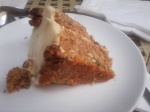
Fuel for IPS Talk run through…

The PG Hub turned 1!

Celebrating breakthrough in Study 1 writing

Dark times…not always bad…
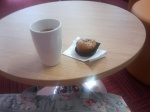
Part of the PG Hub “Dissertation Station” season

Cake selection for Happy Monday!
And the eagle-eyed amongst you, if you haven’t been distracted by all that cake, may have spotted actual pages of thesis hidden in amongst those snap shots. Proof that amongst all those sugar hits, words are emerging….there’s even talk of “sense” and “logic”… But let’s not get too carried away yet…
Back to writing for today now – revisiting my Literature Review section at the moment to add-in a section on Effective Hand Hygiene, covering Soap and Water, ABHR, Technique and, of course, the 5 Moments…
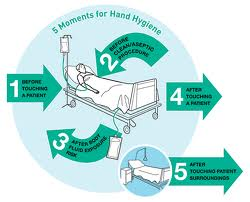
Read Full Post »




